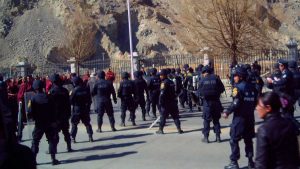Theme 1
China’s Policy on Right to Religious Freedom and the Global Framework
The tradition of protecting religious freedom has marked the histories of people world over. In the recent global history right after the First World War, these traditions fell under a discourse on human rights and achieved a formal recognition as the right to freedom of religion. By the time the 1945 United Nations (UN) Charter was drafted, this particular right had grown into an inalienable part of our international norms. The Article 18 of the Universal Declaration of Human Rights (UDHR) of 1948 — hailed as the foundational international instrument on religious freedom — in particular pronounced the progress in the path of a religiously free and harmonious international community. It informed that “Everyone has the right to freedom of thought, conscience and religion; this right includes freedom to change [one’s] religion or belief, and freedom, either alone or in community with others and in public or private, to manifest his religion or belief in teaching, practice, worship and observance.” The concern for religious freedom appears early, evident from its coding into a foundational instrument like the 1945 UN Charter Article 55. The UN policies on the freedom of religion and belief have thereafter seen many more declarations and conventions.
However, this progress has not been smooth and swift. These international milestones are still a far cry from the realities of ongoing religious intolerance that marks national and local bodies. In this milieu, it does not help the international community that one of its biggest and most influential players like China sabotages such an important freedom.
With its opening up to the world in the 1970s, the People’s Republic of China (PRC) soon joined the international bodies and became signatories to respective legal treaties, conventions and declarations. Since the signing of the UDHR and the UN Charter by PRC in 1971, its role as a Security Council member with veto powers in the United Nations enlarged its international role but has vehemently curbed transparency and accountability. In fact, it has heavily guarded against external actors right from the beginning.
Over 1.2 million Tibetans were killed under Chinese rule and since 2009 a total of 154 Tibetans were forced to self-immolate in Tibet due to lack of civic space to protest through other means. One key aspect about these acts of protests is that “most of the self-immolators have [sic] called for the return of the Dalai Lama and freedom for the Tibetan people.” The PRC’s crackdown against the practice of Buddhism with impunity in Tibet especially forcing the Tibetans to denounce their religious and spiritual leader form the foundational blocks of China’s “freedom of religion with Chinese characteristics.” It has time and again violated international laws undermining the international human rights system.
What is different about China’s approach is that it does not perceive the nature of law as normative unlike the West. The PRC has instead sought to view law in a “functionalist” sense, such that “there are signs that the PRC is perceiving law primarily as a means to achieve concrete benefits. These benefits include economic and reputational gains as well as positive governing effects of depoliticization stemming from legalizing contentious issues…When legal certainty is beneficial for China, it is improved. In other cases, China prefers vague legal norms that are open to interpretation not constraining the exercise of political power.” This sort of approach in the context of core international laws by focusing on the loophole has allowed China to stay legal on paper whilst simultaneously undermining the “spirit” behind the legal instrument.
China on Freedom of Religion or Belief (FoRB)
Within China, the Chinese constitution has protections for the freedom of religion and belief. Implementation of these protections are however reliant on the Communist Party of China (commonly known as CCP- Chinese Communist Party) which is officially an atheist body. Its atheism has to be understood as carrying forward the Maoist legacy that sees religion as a potential threat to the State. As such, the party has failed to uphold these constitutional provisions by maintaining a tight and arbitrary grip over religious observances. Evidence is mounting about potential adverse human rights impacts on religious groups in China, including Tibetan Buddhists, Protestants, Catholics, Muslims and Falun Gong practitioners.
The provisions for protecting religious practice in China are restricted to 5 state-sanctioned major religions — Taoism, Islam, Protestantism, Catholicism, and Buddhism. The ‘sanctioning’ of such religious groups is motivated by the idea of dragging religion below the party-state. Such notions are echoed time and again: in his 2017 report at the 19th National Congress of the Chinese Communist Party, President Xi Jinping stated that, “we will fully implement the Party’s basic policy on religious affairs, uphold the principle that religions in China must be Chinese in orientation and provide active guidance to religions so that they can adapt themselves to socialist society.” It was during this same Congress that President Xi introduced the Xi Jinping Thought into the CCP constitution to carve out Socialism with Chinese characteristics. Such sinicization has moved the CCP into intervening in the appointment of religious heads directly, underscored by the Vatican’s recent decision to recognize the legitimacy of bishops appointed by the Chinese party-government.
Tight party control over religion under his administration is understandably at the heart of Xi Jinping Thought. Right at the inception, the constitution around religion has been designed such that while it allows for Freedom of Religion or Belief in China, it is only insofar as they contain themselves to ‘normal religious activities.’ Notwithstanding the use of vague legal phrasing like ‘normal’, the law goes on to prohibit “making use of religion to engage in activities that disrupt public order, impair the health of citizens, or interfere with the educational system of the State” as well as seeing that “[r]eligious bodies and religious affairs are not subject to any foreign domination.” In their 2017 Congressional Executive Commission on China Report the US also noted this vagueness saying, “[w]ith essential terms such as ‘normal’ undefined, it is unclear whether China’s Constitution protects the same range of belief and outward manifestation that is recognized under international law.” Such steps have allowed the party-state to keep even these state sanctioned religions bound to the CCP’s grip. Ironically, CCP uses the seven religious associations to maintain absolute control over these five sanctioned religion groups in compliance with the party-state as opposed to ensuring that they are able to practice religion freely. Within the CCP’s own party body, atheism is required of its members. In 2011, the director of the Committee for Ethnic and Religious Affairs of the Chinese People’s Political Consultative Conference, Zhu Weiqun had stated that “Those who believe in religion shall not join the Chinese Communist Party.” This remains the policy even to this day and the CCP has even called for its party officials to denounce religion in writing, with those who show religious leanings potentially facing a risk of disciplinary infraction. Some provinces like Zhejiang have moved towards discriminating against applicants who have religious beliefs when recruiting for CCP members. Effects of such policies can be felt on the larger society with people believing in religion reporting large scale discrimination while looking for jobs, business opportunities, work and even travels such as when booking Airbnb rooms.
The extent of the party atheism however appears to follow its members even after they retire from the government capacities and leave the CCP. In the so-called Tibetan Autonomous Region (TAR), with the implementation of a ban on religious observances by government members in the aftermath of a tightened policy on religion in “TAR” in 1994, “it was never made explicit that the ban also applied to retirees and not just serving officials. Officials in work unit meetings orally transmitted the ban and it is not known to have been written down. A similar ban on religious activities has applied to schoolchildren and students in the “TAR” since around 1994.” Such restraints on retired government officials even though they are not legally bound to abstain from religious activities, are nothing but violation of religious freedom — one of the core categories of human rights. Worse still, the cost of not following the order means losing one’s vital source of subsistence, i.e., retirement pensions including access to free medical care. However, the fact that these diktats are deliberately kept oral makes it easy to conceal the ground realities from written (often international) promises that the CCP makes about promoting Tibetans’ human rights.
The regulations on religious freedom in China seem to tighten further. The 2004 Regulations on the Administration of Religious Affairs (RRA) revised in 2017 had “amended, added, and abridged several provisions on general principles, religious groups, religious schools, venues for religious activities, religious professionals, religious activities, religious assets, and legal responsibility (Regulations).” Such detailed control communicated through vague terms have further lent the CCP with sheer power to hold any act or person or organization accountable at whim. For instance, it limits foreign ‘control’ over religious matters in Article 5 with the same vagueness around what they mean by ‘control.’ It also warns against any religious activity that may endanger national security under its Article 4. These overbroad rules have been abused to restrict Uighur population in Xinjiang by citing threats emerging from “three evils” — “ethnic separatism, religious extremism, and violent terrorism.”
In September 2019, the Chinese government published a draft guideline to regulate online religious activities in order to maintain “religious harmony” and prohibit “illegal promotion of religion.” As per the draft guidelines, organizations, institutions and venues are required to obtain a license from provincial religious affairs departments before disseminating religious information online. The license is granted only if the applicant is established within the PRC and its representative is a Chinese citizen and a resident of mainland China. Overseas organizations or individuals are prohibited from engaging in any online religious information services in China.
Studies have argued that “the outdated religious policy has rendered itself ineffective in controlling religions, all the while antagonizing the Chinese populace and the world community. The religious policy has become one of the liabilities in China’s stride for modernization and for entering the global stage.” The problem with constitutional protection of religious freedom in China is that it is reserved only for the 5 religious-groups, and by virtue of that, criminalizes the rest. This is a clear marker of the CPC’s tight grip on freedom of religion or belief. This is a clear marker of the CCP’s tight grip on freedom of religion and belief. Practitioners of Falun Gong who are not state-sanctioned are branded as “heterodox teachings” (CHN: xie jiao) and face punishments such as torturous imprisonment under Article 300 of the CCP’s Constitution. However on further enquiry, we notice that heavy restrictions are also placed on the state-sanctioned religions like Tibetan Buddhism.
To counter the rigid precedence of state over nationals in China, it is important to ensure that there is a shift in the CCP’s gaze: it has to allow freedoms to roll out so that people’s liberties become equally important to defining a state. For an authoritarian state like China, this will not only help ameliorate the lives of those who are facing religious persecution but simultaneously also solidify the very foundations of an international infrastructure like human rights beyond its borders.
The US on China’s Freedom of Religion and Belief
The US has acknowledged the need to voice against the religious suppression in Tibet, Xinjiang and other particular areas of concern. It since 1999 catalogued the PRC as “Country of Particular Concern” under its International Religious Freedom Act of 1998 for its stock of undermining acts against religious freedoms.
Most recently in 2020, the Congress passed the Reciprocal Access to Tibet Act in order to allow access to American international media in a bid to promote free press. Doing so will usher the necessary transparency that the authoritarian architecture of China currently lacks surrounding several issues including the freedom of religion or belief.
In April 2018, the United States Senate also unanimously passed a resolution declaring that the “identification and installation of a future 15th Dalai Lama, is a matter that should be determined solely within the Tibetan Buddhist faith community.” The resolution further states that any interference by the Chinese government is “invalid interference.” This year, the U.S. Congress is pending the approval of the Tibetan Policy and Support Act of 2019 at the Senate Committee on Foreign Relations which was previously passed at the House of Representatives with a bipartisan supermajority vote. This update will seek to intensify the U.S.’s concerns over religious freedom and environmental protection in Tibet. It also seeks to build on the protection coded in 2005 House Resolutions 337 against the PRC’s control over the reincarnation of His Holiness the Dalai Lama on the grounds that it interferes with “internationally recognized right to religious freedom…and to highlight the fact that other countries besides China have long Tibetan Buddhist traditions and that matter related to reincarnations in Tibetan Buddhism are of keen interest to Tibetan Buddhists populations worldwide.”
The EU’s outlook on FoRB in China
Drawing from international laws on FoRB namely the UDHR Article 18 and International Covenant on Civil and Political Rights (ICCPR) Article 18, both in tandem with UN Human Rights Committee’s General Comment number 22, the Foreign Affairs Council which met at Luxembourg in 2013 formulated ‘EU Guidelines on the promotion and protection of freedom of religion or belief’. It sought to determine the EU’s FoRB policy vis-à-vis third parties to explain what the international human rights standards on freedom of religion or belief are, and give clear political lines to officials of EU institutions and EU Member States, to be used in contacts with third countries and with international and civil society organisations. They also provide officials with practical guidance on how to seek to prevent violations of freedom of religion or belief, to analyse cases, and to react effectively to violations wherever they occur, in order to promote and protect freedom of religion or belief in the EU’s external action.” The EU has seen growing seriousness around gaining religious literacy and building dialogue on FoRB as evident from its appointment of Special Envoy for FoRB in 2016.
Under the said Guideline, the EU had stated the importance of challenging “attempts to make the exercise of human rights conditional upon state permission, for example by compulsory registration of religious or belief groups and/or the banning of unregistered religious activity.” Such a pointer is contested by the practices adopted by China of sanctioning religion and criminalizing others. Another point in the Guidelines, “to take action when requirements for religious or belief-related organisations to register are used as a means of state control rather than to facilitate the exercise of the freedom of religion or belief” is also sabotaged by the ongoing control over religious groups by the CCP such as holding compulsory patriotic training for heads of the seven religious associations. Even the third point under the same Guideline that aims to encourage protection of religious heritage sites and worship places is challenged by the CCP’s measures to demolish monasteries, churches, including tight surveillance over housechurches, and mosques in China.
Owing to these observations, the EU has voiced its discontentment as seen at the 2019 European Parliament. It has noted the deteriorating freedom of expression and religion under President Xi Jinping despite economic victories. Legal instruments like the February 2018 Regulations on Religious Affairs have increased control over religious freedom — with China hosting one of the largest number of religious prisoners today — putting the country at a “new low point since the start of the economic reforms and the opening up of China in the late 1970s.” The Parliament also recognized the need to press on its member states the importance of preventing the CCP from conducting its activities of control including espionage over religious and ethnic groups inside the EU. In order to ensure finally that the CCP led China comply with international standards around freedoms such as the FoRB, the European Parliament has called China to ratify the ICCPR, as well as allow “free, meaningful and unhindered access to Xinjiang province and Tibet Autonomous Region for journalists and international observers, including for the UN High Commissioner for Human Rights and UN Special Procedures” as part of the political dialogue as stated in the 2013 EU Guideline.
The EU efforts on freedoms and human rights have however not attracted the same level of enthusiasm from Beijing. The 2019 European Parliament also expressed its disappointment in the inefficacy of the 37th round of the EU-China Human Rights Dialogue and the absence of Chinese officials from the continued dialogue expected on 2 April with civil society groups for the second time in a row.
***
QUESTIONS AND ISSUES TO BE CONSIDERED
- What are the larger ramifications of China orienting its policy on freedom of religion or belief to muster control for political gains?
- To what extent is China’s policy on freedom of religion or belief different and often poles apart from the policies of the EU and the US?
- By shunning all possible international mediation from outside, is it possible to imagine China ensuring Freedom of Religion or Belief in the country on its own? If not, how should the EU, the US and other countries reformulate their policies to address critical issues of religious persecution s by China?


